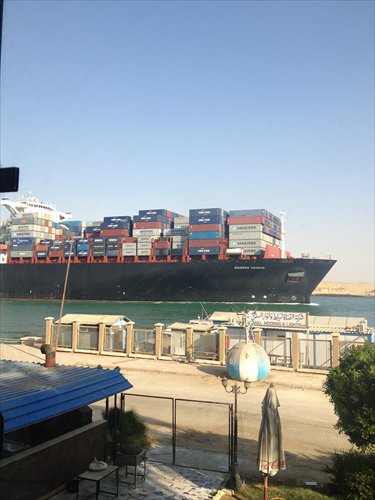Egypt in limbo

People walk past a line of tanks on September 21 in downtown Cairo. Photo: Feng Yu/GT
Egypt has been ruled by an interim government since July 3, when its first democratically elected president Mohamed Morsi was ousted. The former president has been put on trial on November 4, though the court trial was repeatedly interrupted by him and postponed until January.
Together with another 14 top Muslim Brotherhood members, Morsi was accused of killing protesters. Days before the trial, thousands of supporters protested in the streets of Cairo.
The power vacuum period witnessed uprisings and the dissolution of the Muslim Brotherhood as an NGO.
In recent weeks, violence targeting Christians in Cairo erupted, with four members of a family shot dead at a church wedding. Just prior to the trial of several Brotherhood leaders, judges in a court withdrew, with media speculating that they did so out of fear of retaliation.
To answer the ongoing political conundrum facing Egypt, Global Times reporters interviewed local scholars, diplomats, civilians, as well as Chinese businesspeople to gauge the reality of the situation before a new government is formed.

A video broadcast image shows ousted President Mohammed Morsi (center), arriving for a court hearing in Cairo, November 4. Photo: CFP
Causes of revolutions
"Correction" was a word that Global Times reporters frequently heard, after a long period of political turmoil and military intervention.
Egyptian people have longed for democracy and hoped that a government representing the general interests of the country and people can change the Mubarak-era power structure and improve the living standards of Egyptians.
The 30-year rule of Hosni Mubarak witnessed severe corruption among government officials and economic slowdown. The rise of the Muslim Brotherhood, to some extent, met the expectations for change in the political system.
Dr Ahmed Kandil, senior researcher at the Energy Security and Asian Affairs of the Al-Ahram Center for Political and Strategic Studies, said that there are many reasons why Morsi swept to power. The Muslim Brotherhood was established 80 years ago and gained public support all over the country through its charitable activities, helping poor people gain access to education, as well as medical and other social services.
It is generally recognized that there have been two revolutions in Egypt. The first one took place on January 25, 2011 which led to Mubarak's stepping down in February, and ended up with Morsi as president.
Dr Ahmed Kandil regards this as a failure, as Morsi proved to be inept at managing state affairs. The Muslim Brotherhood failed to manage the economy, causing the unemployment rate to jump to 25 percent. Inflation also increased sharply, with some estimates showing that it reached 30 percent. Economic growth declined to 1.5 to 2 percent, compared to 6 to 7 percent before the revolution. Public debt increased sharply, added Dr Kandil. The Egyptian pound depreciated by 20 percent against the US dollar.
"All the indicators show the economy is getting poorer and life in all aspects is getting worse. Tourists don't come. At the same time, we didn't see any plan that the Muslim Brotherhood were ready to implement. We knew that there are many problems from the post-Mubarak era, but we didn't have any optimism for the future with Muslim Brotherhood," Dr Kandil said. "That's why the second revolution happened," he added.
Kandil's viewpoints were echoed by Hassan Nafaa, a professor of political science at Cairo University. Professor Nafaa told the Global Times that when Mubarak stepped down, the military government lacked experience in handling the situation and organized parliamentary and presidential elections first while neglecting the drafting of a constitution. This allowed the Muslim Brotherhood to take advantage of political loopholes and Morsi to become president. Morsi then tried to establish a constitution that favored him and his organization.
A deteriorating economic situation and high unemployment rate prompted the second revolution, which took place on June 30.

Two Egyptians enjoy shisha tobacco at a cafe in the Giza area in Cairo. Photo: Feng Yu/GT
The correct path
Since Egyptians realized Morsi was a bad choice for the country, how can the country make the right political correction? In the eyes of Professor Nafaa, whether the constitution or president comes first is a question that will determine Egypt's fate. Professor Nafaa insisted that only by following the constitution-parliament-president process can stability and development really be achieved. He told the Global Times that Morsi simply took advantage of the procedural loophole of being elected president before a constitution was approved. When he tried to establish a constitution that consolidated his power, he was jointly opposed by the general public and the military.
Politics and the economy are inseparable factors in any country. Tourism, the Suez Canal, the petroleum industry and foreign reserves used to be the four main sources of Egypt's revenue. After the revolutions, foreign ministries in many countries warned people against traveling to the turbulent country before stability was achieved.
Tourism is one of the worst-hit sectors of the economy. Rasha Mohamed Hamed, a tour guide who is fluent in Chinese, told the Global Times that we were her first customers in three months. She said that there had been very few foreign faces on the streets since the revolution. She told us that there were no longer queues at museums or in the Giza area, home to the world-famous pyramids.
Egypt's tourism minister claimed that the country aims to attract 13.5 million visitors next year, bringing in $11 billion in revenues as it launches an international campaign to lure back foreigners put off by the political turmoil in the country, reported Reuters. In 2010, 14.7 million foreign visitors went to Egypt. Regaining the confidence of foreign visitors will be a major task for this government.
However, when asked about confidence in the country, the response from Egyptian people was overwhelmingly positive, although they were divided on how much time the country needed to get on the right track.
Mohamed Ali, an engineer and businessman at Formula Contracting and Infrastructure, told the Global Times that he was certain the country would recover soon, assuring us that in one or two months, foreigners would not need to worry about safety.
Professor Nafaa is more guarded, predicting the country will recover in five years, or one full presidential term, but only if the constitution, parliament and president can meet the needs of the majority of Egyptians.

A container vessel passes through the Suez Canal. Photo: Feng Yu/GT
Chinese business prospects
It's obvious that the crippled economy is in dire need of foreign investment if it is to be revived. Li Daixin, executive vice general manager of Egypt-Teda Investment Company in the China-Egypt Suez Economic and Trade Cooperation Zone, has worked in Egypt for six years. The company is leading the investment in the economic zone, which is a cooperation between China and Egypt.
Li told the Global Times that he is confident the situation will improve soon, adding that with experience gained from the January 25 revolution in 2011, the interim government proved that it could handle emergency situations much more capably. Li believed that there are opportunities for Chinese companies in Egypt so long as stability is gained.
His remarks are echoed by Xiang Rubing, vice president of Zhejiang Jushi Group Co Ltd, a leading international company in the fiberglass industry. Xiang told the Global Times that her company has invested 1.6 billion yuan ($260 million) in a global manufacturing base in the economic zone, which is also Jushi's first overseas manufacturing base.
"Egypt still has great advantages as far as geographic factors are concerned. Historically, there has been no civil war in Egypt. It is still an ideal place for a company like Jushi if it wants to break the bottleneck during the course of globalization," Xiang told the Global Times.
Xiang claimed that businessmen have to think differently when opportunities and challenges are concerned. Xiang said the top management team in her company thought the time was right when Egypt entered its democratic process. In addition, a new government will draw up favorable policies to bring in foreign investors if it wants to achieve development both politically and economically.
Chinese workers are confident in the future of Egypt. Zhang Zhenzhao, a Shandong resident who now works in the marble business in Cairo, told the Global Times that he felt safe working there, and his wife has joined him to work in the capital. Zhang also works as a translator as he studied Arabic in a Beijing vocational institute.
Ma Na, also from Shandong, took her 8-year old son, Yang Ziqi, to settle in Cairo. Yang has taken a local name, Mahmad, as he studies at an international school. Yang told the Global Times that he has made friends with local students. Ma said she doesn't think it unsafe for her son to be in Egypt. Both Ma and Zhang agree that the protests and clashes aren't aimed at civilians.
Perhaps the best evidence of the public's confidence in the country came when Global Times reporters went shopping near Tahrir Square in Cairo at about 10:30 one night. We found the outdoor market was just like any market elsewhere in the world. Local people of all ages were relaxing on the night street, just half an hour before curfew starts.